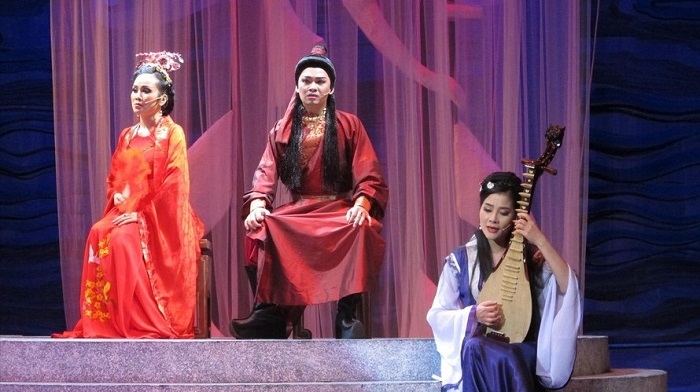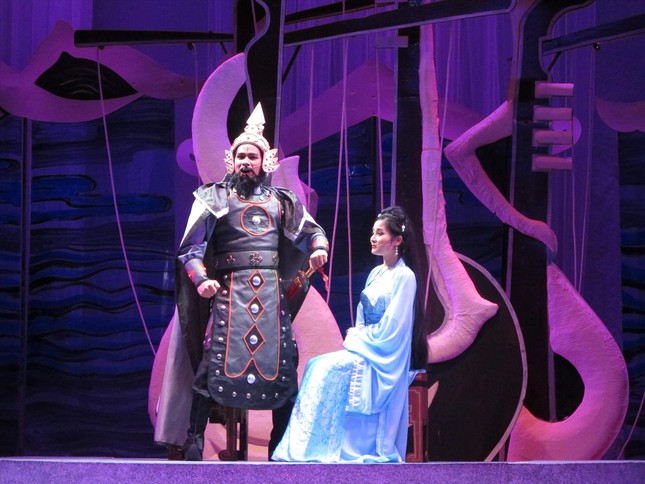With their latest ‘cai luong’ (reformed opera) play entitled ‘Nguyet Cam Ca – Kieu’, which was inspired from Vietnam’s 18th century poetic masterpiece ‘Tale of Kieu’ by celebrated poet Nguyen Du (1776 - 1820), artists from the Vietnam Cai Luong Theatre have left deep impressions and profound feelings on the audience, by conveying a message that women with beautiful souls deserve to be loved and to be happy.

A scene in the 'Nguyet Cam Ca - Kieu' play. (Photo: tienphong.vn)
Nguyen Du's ‘Tale of Kieu’ has been established as an exemplary poetry work of the highest level in storytelling, and a masterpiece of Vietnamese literature. Therefore, it is not easy for artists to renovate or adapt the masterpiece into other art forms which can gain appreciation from art critics and audiences.
In the past, many ideas have been put forward under the name of ‘Tale of Kieu’ but they have failed to nail it and even caused controversy among public opinion, as they unintentionally trivialised the value of the work.
Therefore, the creative team of Vietnam Cai Luong Theatre were put under a lot of pressure when deciding to bring ‘Tale of Kieu’ to the ‘cai luong’ stage, especially when their art colleagues have succeeded in adapting the masterpieces into cinema, theatrical play, and puppetry.
The play was directed by People's Artist Hoang Quynh Mai, scripted by Nguyen Hieu, and adapted to ‘cai luong’ art form by Meritorious Artist Phan Ngoc Chi. It also gathers the participation of musician People's Artist Hoang Anh Tu, and set designer Nguyen Hoang Phong.
Like other adaptions of ‘Tale of Kieu’, ‘Nguyet Cam Ca – Kieu’ also recounts the life, trials and tribulations of Thuy Kieu, a beautiful and talented young woman, who has to sacrifice herself to save her family. However, the artists utilise the power of music to express the mood and feelings of the characters in scenes that are turning points of the play, from the scene when Kieu is making a date with Kim Trong, to her humiliation of being a slave at Thuc Sinh's house, and her unbreathable sorrow at Tu Hai's death.
Director, People's Artist Hoang Quynh Mai said that she came up with the idea of choosing the lute and music, as a way to express the ups and downs in Kieu’s life after referencing a research work on ‘The Tale of Kieu’ by Prof. Tran Van Khe. The different vibes in Kieu's lute goes amazingly well with the lyrical and poetic language in the art of ‘cai luong’.

The stage is set with images of four modified lutes, which not only stylise the women's curves, but also contribute to evoking many emotional effects. (Photo: tienphong.vn)
‘Nguyet Cam Ca - Kieu’ also leaves strong impressions on the audience from its stage design. Without a complicated and glamourous set up, the stage is set with images of four modified lutes, which not only stylise the women's curves, but also contribute to evoking many emotional effects. The lutes create a romantic and poetic setting for Kieu and Kim Trong on their date, but in the next scene, they symbolise a barrier locking Tu Hai, and then become a shelter to Kieu.
Notably, the play showed a daring adaptation from the director and scriptwriter, as they changed the ending of the story. Instead of letting the character Tu Hai die, like the original, the play ends with the image of Tu Hai coming back to life and holding Kieu in his arms.
Stage director Hoang Quynh Mai shared that she was born in Tien Dien town, Nghi Xuan district, Ha Tinh province, which was also the hometown of poet Nguyen Du. Verses in ‘The Tale of Kieu’ have gone into her memory since she was a little girl, making her nurture the dream of staging a play based on the masterpiece in her own style.
By letting Tu Hai come back to life from death, she wants to convey a hope that Kieu, and women with beautiful souls in general will always be loved.
The success of the play is also attributed to the excellent performance of both veteran and talented young artists from the Vietnam Cai Luong Theatre, including Nhu Quynh, Minh Hai, Trung Tuan, and Phuong Thuy, who play the roles of Thuy Kieu, Tu Hai, Thuc Sinh and Phuong Thuy, respectively.
200 years after it was released, the story of ‘Tale of Kieu’ has still won the hearts of audiences through the ‘Nguyet Cam Ca - Kieu’ play, which has confirmed the lasting vitality of the Vietnamese poetic work. The adaption also shows the creativity and efforts of Vietnamese artists in bringing a fresh breath and vigour to a classic literary work.